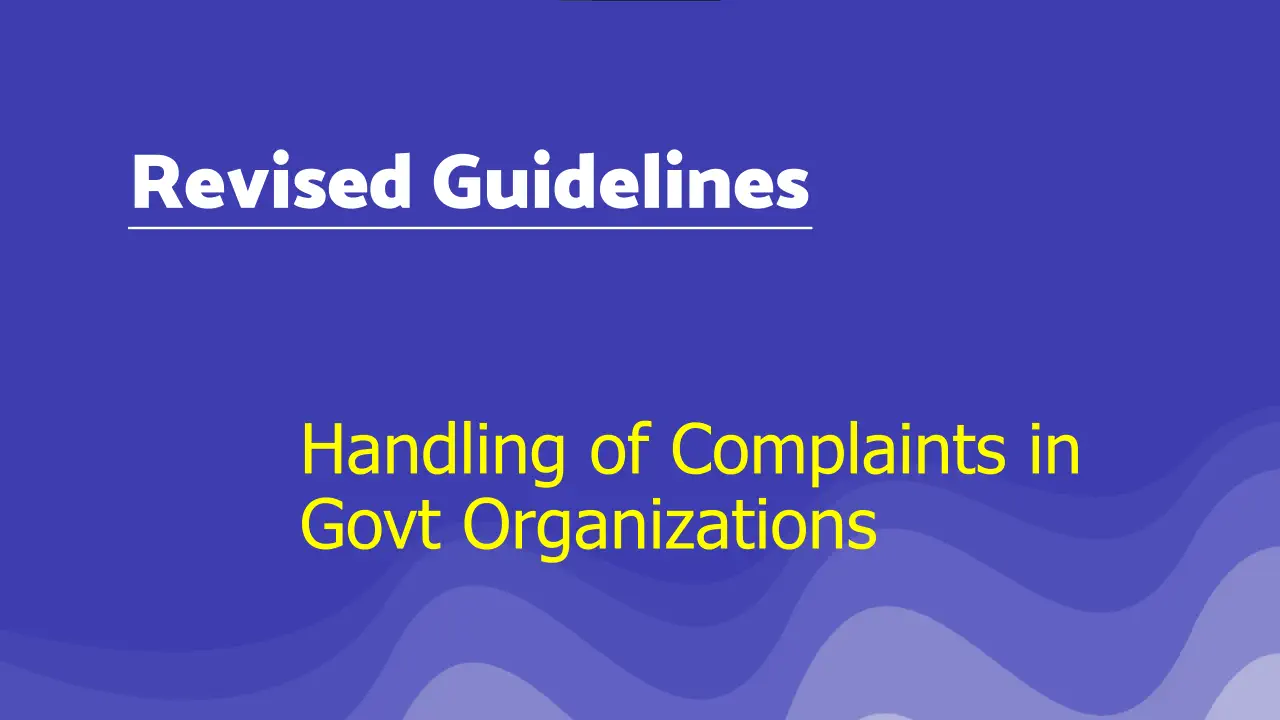Revised Guidelines on Handling Complaints in Government Departments

The Ministry of Personnel, Public Grievances & Pensions has issued new guidelines regarding the handling of complaints in Ministries, Departments, and Organizations under the Government of India. These revised guidelines, effective from October 9, 2024, provide clarity on how different types of complaints will be managed, aiming to enhance transparency and accountability in administrative procedures.
Key Highlights of the Revised Guidelines
The revised guidelines partially modify the previous ones issued on September 28, 2022. Here are the major points covered in the updated guidelines:
1. Anonymous Complaints to Be Filed Straightaway
The new rules explicitly state that anonymous complaints, i.e., those without both the name and address of the complainant, will be immediately filed without any action. Regardless of the nature of allegations, such complaints will not be entertained.
2. Handling Non-Specific or Unverifiable Allegations
Complaints containing non-specific or unverifiable allegations may be dismissed by the competent authority without verifying the identity of the complainant. This step aims to reduce the burden of dealing with baseless claims and ensures that only credible complaints are pursued.
3. Complaints Involving Vigilance Matters
Non-anonymous complaints containing specific allegations of corruption or those involving vigilance concerns will be scrutinized. Such complaints will be handled by the Chief Vigilance Officer (CVO) of the respective Ministry, Department, or Organization. Complaints of a non-vigilance nature will be handled by the Joint Secretary or Additional Secretary in charge of Administration.
4. Verification Process for E-mail and Electronic Complaints
All complaints, including those received through email or electronic media, must be verified. The concerned Ministry or Department will reach out to the complainant using registered post or authenticated electronic media to confirm the veracity of the complaint. If no response is received from the complainant within 15 days, a reminder will be sent. Failure to respond to this reminder will result in the complaint being treated as pseudonymous and subsequently filed.
5. Timely Decision-Making
To ensure a swift resolution, the Ministry, Department, or Organization concerned must decide whether to examine or file a complaint within three months of its receipt. If further examination is required, it could take the form of a preliminary inquiry or a formal investigation, as decided by the competent authority.
6. Communication with Accused Officers
If the decision is made to proceed with an investigation, a copy of the complaint must be sent to the officer(s) against whom the allegations are made, within 15 days of that decision. This ensures transparency and allows the accused to be informed of the charges against them.
Special Guidelines for State Government-Related Complaints
Complaints received by Ministries or Departments of the Government of India concerning officers of the All India Services (AIS) or Central Government employees working with State Governments will be forwarded to the respective State Government for action. The State Government may choose to undertake further scrutiny or action, with a requirement to notify the officer(s) concerned within 15 days.
Review Committees for Timely Disposal
A Review Committee will be constituted in each Ministry and Department to monitor pending complaints. This committee will include the Chief Vigilance Officer (CVO) and will be chaired by an officer not below the rank of Additional Secretary. Monthly meetings will be held to review cases that have been pending for more than two months to ensure timely resolution.
Handling Complaints Against Secretaries
A group headed by the Cabinet Secretary will scrutinize complaints against Secretaries to the Government of India. This group will include key figures like the Principal Secretary to the Prime Minister and the Secretary of the Department of Personnel & Training (DoP&T). They will have the authority to either dismiss frivolous complaints or initiate appropriate action after preliminary scrutiny.
Complaints Against Public Sector Chiefs
Complaints against Chief Executives of Public Sector Enterprises and Chairpersons/Managing Directors (CMDs) of Public Sector Banks and Financial Institutions will be considered by a designated Group of Officers. This group will follow the prescribed guidelines while scrutinizing the complaints referred to them.
Ensuring Fairness and Accountability
These revised guidelines are aimed at ensuring that complaints are handled systematically, with appropriate checks in place to prevent the misuse of the complaint process. By streamlining how complaints are received, verified, and acted upon, the government hopes to improve efficiency and maintain the credibility of the grievance redressal process.
The updated rules will likely minimize the administrative burden caused by unfounded or frivolous complaints, while still upholding the right of individuals to report genuine grievances. This balance between discouraging baseless complaints and ensuring genuine concerns are addressed is key to maintaining transparency in government operations.
Read the full OM below:
 Loading…
Loading…


